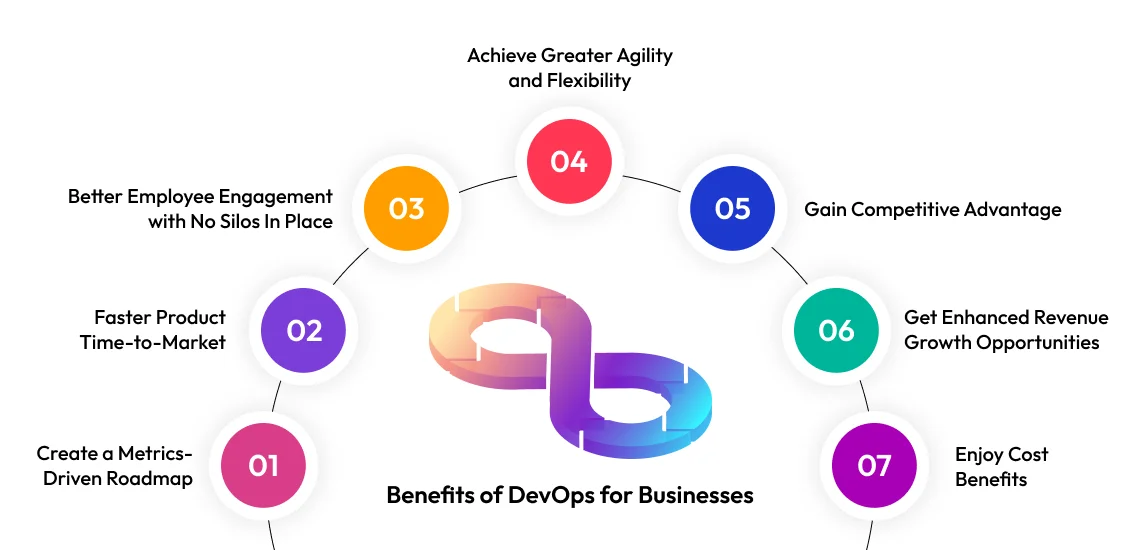Technology
Top Benefits of DevOps You Can’t Afford to Ignore

Since its introduction, DevOps methodologies have sparked widespread interest in the IT industry, driven by the significant benefits they bring to project pipelines. This blog delves into an in-depth analysis of both the development and business benefits of DevOps, helping organizations and developers make informed decisions about implementing it in their projects. Discover how DevOps can transform your operations and enhance development processes.
Do you know that, on average, large IT projects (software development and digital transformation ones specifically) run 45% over budget and 7% over time? These are the major reasons why the majority of software development projects fail to meet their deadlines or objectives. No business would want that for their important projects!


That’s why the majority of businesses face unprecedented pressure to deliver high-quality software quickly and efficiently. What if we say that there’s a way to avoid that surge of software development cost and inability to meet the close deadlines of large projects?
Yes, thanks to the benefits of DevOps, both businesses and developers can revolutionize their approaches to deal with the software development lifecycle (SDLC) and achieve all financial, timeline, quality, as well as security goals.
This blog is all about the benefits of DevOps automation without compromising on any software quality measures.
What Are The Business Benefits of DevOps?


Speed with precision is what all businesses want, whether to be achieved in the form of developing and upgrading the new software product or enhancing the existing processes. DevOps methodologies are the handy tools of today’s businesses to thrive in the market competition and streamline their processes to market their offerings at a faster pace to serve their customers.
Speaking of DevOps streamlining processes, what makes it different from agile principles, especially in terms of less time-to-market? In the debate of Agile vs DevOps – DevOps is more focused on making a way to streamline and improve existing processes for better efficiency – more like this strategic automation, whereas Agile is more user-centric and aims for a product around matching their demands.
So, with the appeal of making cross-functional teamwork possible while considering all software development intricacies, what’s included in the business benefits of DevOps? Let’s learn all:
Create a Metrics-Driven Roadmap
DevOps promotes the use of key performance indicators (KPIs) and metrics to guide decisions and measure progress. When it comes to crafting a metric-driven roadmap, three theories of DevOps are considered:
- Staff optimization
- Expense cut down
- Increase in sales
By creating a metrics-driven DevOps roadmap, organizations can:
- Track Performance: Monitor development and operations activities to ensure alignment with business goals.
- Identify Bottlenecks: Use metrics to pinpoint inefficiencies and areas for improvement.
- Improve Decision-Making: Data-driven insights that help prioritize tasks and allocate resources effectively.
Faster Product Time-to-Market
One of the core benefits of DevOps is its ability to accelerate the product development lifecycle, enabling faster product time-to-market.
To do so, it implements a CI/CD (continuous integration and continuous deployment) pipeline that automates the integration and deployment process that helps businesses reduce delays and speed up product release, even the ones large-scale and complex in nature.
The inclusion of enhanced collaboration and efficient streamlined processes with the help of DevOps eliminates bottlenecks to take the product to market at speed.
Better Employee Engagement with No Silos In Place
DevOps helps to foster a culture of collaboration while breaking down silos. It does that by allowing the building shared project milestones and pipelines to share project details and progress and updates related to everything around that.
This indirectly includes creating Kanban boards with work items represented as cards, providing a shared view of the development process. With more approaches associated with DevOps, it enables cross-functional teams to work together towards common goals, enhancing cooperation.
It also makes employees feel more engaged and valued when they are part of a cohesive team with shared responsibilities. The most important benefit of DevOps implementation is that it offers open communication channels, and collaborative efforts encourage innovation and creativity.
Achieve Greater Agility and Flexibility
DevOps enhances an organization’s ability to respond quickly to changes and new requirements, resulting in greater agility and flexibility.
Popular practices and DevOps trends, such as the use of containerization and cloud-based infrastructure, provide the agility and flexibility to quickly adapt to changing business requirements and market conditions. This makes organizations more responsive and innovative.
DevOps also enables the use of Agile methodologies and iterative development to make the product quickly adjust with the feedback and go with the continuous improvement. Moreover, DevOps practices support scalable infrastructures that can grow with business needs.
Gain Competitive Advantage
By leveraging DevOps for mobile app and web app development projects, businesses can accelerate their development cycles, enhance product quality, and foster a culture of innovation and collaboration.
These capabilities not only improve operational efficiency and customer satisfaction but also enable businesses to stay ahead of the competition and capitalize on new opportunities in the market.
Get Enhanced Revenue Growth Opportunities
DevOps practices create an environment where businesses can innovate rapidly, improve product quality, and respond effectively to market changes.
This leads to faster time-to-market, enhanced customer satisfaction, operational efficiency, and the ability to capitalize on new revenue opportunities, ultimately driving significant revenue growth.
Enjoy Cost Benefits
At its core, DevOps implements automation in its processes, and as a benefit of DevOps automation, it reduces the need for manual intervention and lowers operational expenses associated with it.
More cost benefits are associated with enterprise DevOps practices by saving big organizations millions of dollars associated with solving 80% unplanned system downtimes caused by improper planning.
Plus, the DevOps pipeline also includes proactive monitoring of application code changes and deployments that help to find code loopholes and bugs in their starting stage, resulting in quick resolution and thus reduction in downtime costs.
Moreover, strategic project planning and effective resource allocation help to reduce waste and contribute to overall cost efficiency.


What Are the Benefits of DevOps Implementation In SDLC?
Traditionally, the SDLC (Software Development Lifecycle) approach was more like following sequential procedures that start from requirement gathering followed by product design and development, and then going for testing and deploying and carry forward to support and maintenance in the post-product deployment scenarios.
Thanks to DevOps and agile methodologies, each and every task is divided into smaller chunks to strategically offer the following benefits:
Streamlined & Simplified Software Development Processes
DevOps is known for its transforming approach to software development by streamlining and simplifying the software development process. It includes strategic decision-making, bifurcation of tasks, and more, considering the maximum productivity of resources in mind. DevOps simplifies and streamlines SDLC processes by:
- Implementing CI/CD pipeline that automates code integration, testing, and deployment processes.
- Automated DevOps testing strategy enforcement ensures that issues are detected and resolved early, reducing the time and effort required for manual testing and rework.
- Considering infrastructure as code (IaC) that looks after managing and provisioning computing infrastructure through machine-readable configuration files. It also automates the setup and management of infrastructure, making it easier to maintain consistency across development, testing, and production environments.
- Automating repetitive and time-consuming tasks, DevOps reduces the need for manual intervention.
This approach leads to faster, more reliable, and higher-quality software delivery, ultimately providing significant value to organizations and their customers.
Keeps Devs & Ops Teams On the Same Page
After CI/CD, DevOps is more focused on keeping the entire team of developers and operations professionals working on the project on the same page.
It helps to do that by establishing shared communication channels and setting up Kanban boards to have total visibility on tasks assigned to particular professionals. So, cross-functional teams can work closely together and better understand each other’s challenges and requirements.
With transparency in project processes and executions, both teams get assured that they are working on the same goals, avoid misunderstanding and project management-related friction, and lead the project to more successful outcomes.
Rapid Software Development
One of the primary and should not be overlooked benefits of DevOps automation is that it accelerates the software development process. The reasons include:
- Continuous integration and continuous deployment (CI/CD) practices
- Shared communication channels between development and operations teams
- Transparency across software development tasks (done, assigned, in progress, on hold, etc.)
By offering all these things, DevOps helps organizations stay competitive and responsive to market demands.
Teams Get Buffer for Innovation & Problem Solving
With the automation of routine tasks and the reduction of manual intervention, DevOps provides developers with more time and resources to focus on innovation and problem-solving.
This buffer allows teams to experiment with new ideas, develop creative solutions, and implement improvements without being bogged down by repetitive operational tasks.
Security At The Center of Focus
DevOps, from the beginning, gives more focus on the “shifting security left” principle that ensures the incorporation of security practices earlier in the software development lifecycle. This includes:
- Threat modeling and security requirements gathering during the planning phase
- Automated security testing integrated into CI/CD pipelines
- Static code analysis to identify vulnerabilities in code
- Dependency scanning to monitor known vulnerabilities in open-source libraries
DevOps enforces all, considering the consistency while not impacting the effect of development speed.
It also enables security teams to provide their guidance on ensuring the app’s security and robustness at the start of the app development process. Moreover, the shared responsibility offered by DevOps ensures the associated teams ensure security across the entire delivery lifecycle.
Increased Deployment Stability
As DevOps is focused on frequent and smaller releases, it ensures increased deployment stability. These incremental goal-based changes are easier to manage and test and thus risk significant issues during deployment.
Moreover, automated testing associated with DevOps works on identifying and fixing issues early on during the build time to ensure deployment stability, minimizing the need for bug fixing in post-deployment scenarios.
Prioritizes Automation Over Repetitive Operations
With this, we all can agree that software development is associated with many repetitive processes, which can be frustrating and error-prone for professionals working on it. To avoid such and set professionals free from such repeating tasks, DevOps brings process automation into software development.
It offers automation of software building, testing, and deploying code processes while ensuring consistency, reducing human error, and freeing up team members to focus on more strategic and value-added activities.
Early Detection of Errors
With CI/CD pipeline, DevOps also includes continuous integration and continuous testing approach that facilitates early detection and resolution of code errors. By doing so, it prevents them from escalating into larger issues.
This early detection improves overall software quality and reduces the cost and time associated with bug fixing.
Greater Traceability and Visibility to SDLC
DevOps uses an integrated toolchain, such as Azure DevOps, which connects all SDLC processes, from planning and development to testing, deployment, and monitoring – that offers end-to-end visibility and traceability across SDLC.
In its toolchains, it also has work items that are directly linked to the corresponding code changes, commits, and pull requests.
Its automated CI/CD pipeline captures the entire history of changes and deployments, providing full traceability of code development, changes, integration, and deployment versions.
Speaking of versions, DevOps also brings concepts like version control, branching, and merging strategies that make every code change traceable from its origin.
Moreover, the monitoring and observability in DevOps offers visibility into the runtime behavior and performance, enabling better traceability of issues.
Be it using DevOps for SaaS development or any other software development project, if used strategically, DevOps can offer many benefits to businesses.
When DevOps Might Not Be A Good Fit
While DevOps offers numerous benefits, it may not be the right fit for every organization or software development situation. Here are some scenarios where implementing DevOps might not be beneficial for your business:
Legacy Systems and Technology Debt
Organizations with significant legacy systems and technology debt may find it difficult to integrate DevOps practices without major overhauls. There will also be chances that your legacy system may not be compatible with modern DevOps tools and practices.
Still, if you’re persistent in gaining the benefits of DevOps implementation for your legacy system modernization, you may have to give more significant effort to modernize.
Regulatory and Compliance Constraints
DevOps often benefits in terms of process automation, which may not be accepted by certain industry regulatory standards. The reason is that if DevSecOps is not followed well, it could lead to potential risks during automation.
Organizations handling sensitive data may need to ensure that DevOps practices align with strict data security policies and standards. In this, learning the difference between DevOps Vs DevSecOps can help significantly.
Small-Scale Projects
Projects that are simple, short-term, have minimal changes, etc., like a low-budget startup MVP development with a limited scope, might not be able to justify the cost of implementing and maintaining DevOps tools and practices within its tight budget. The overhead of implementing DevOps practices may outweigh the benefits.
Stable Environments
DevOps is associated with continuous improvement, automation, and iterations. When talking about stable software environments – maybe such are highly stable and changes are infrequent. Therefore, the need for continuous integration and deployment may be minimal. In such cases, DevOps can be an inappropriate effort.
Short-Term Focus
DevOps adoption is a long-term investment. Organizations looking for immediate results may be disappointed, as the benefits of DevOps often become evident over time.
Also, DevOps is not just the process that once it has been done, you’ll not need it. It promotes continuous efforts and iterations to take your product to success.
Inadequate Tooling and Automation
DevOps is highly beneficial for businesses and developers because of its automation in testing, deployment, and monitoring processes. To enforce all effectively, it requires the right DevOps tools in place.
It’s not just about using top DevOps tools for the project; on the contrary, using too many tools without proper integration and management may face complexity and inefficiency.
How MindInventory Can Help You Embrace the Potential of DevOps
Though with multiple benefits of DevOps, successfully implementing DevOps requires a significant investment in tools, processes, and cultural change. This is where a DevOps consulting firm like MindInventory can help.
MindInventory is a leading DevOps solutions provider that helps organizations of all sizes harness the power of DevOps. Our team of experienced DevOps experts for hire can guide you through every stage of your software development journey, from assessment and strategy to implementation and optimization.
So, have a DevOps project for us? Contact us today!
FAQs on DevOps
DevOps ensured better collaboration by breaking down silos between development and operations teams, fostering a culture of communication and shared responsibility.
DevOps speeds up delivery through Continuous Integration (CI) and Continuous Deployment (CD), automating code integration, testing, and deployment processes.
Yes, DevOps improves software quality by incorporating automated testing, continuous monitoring, and real-time feedback, ensuring issues are identified and resolved early.
No, DevOps may not be suitable for small-scale, short-term, or highly specialized projects where the overhead of implementing DevOps practices might not be beneficial.
At the time of implementing DevOps for your software development project, your organization can expect challenges like resistance to change, lack of skilled personnel, resource constraints, regulatory compliance issues, and integration difficulties with legacy systems.
To implement DevOps in your software development lifecycle, you can use tools like Docker, Kubernetes, Ansible, Jenkins, Chef, Puppet, Git, Terraform, Selenium, and many other popular ones.
DevOps contributes to the cost efficiency of the project by increasing the efficiency of software delivery through CI/CD implementation, reducing manual efforts by automating tasks, breaking silos within Devs and Ops teams, and many other ways.











